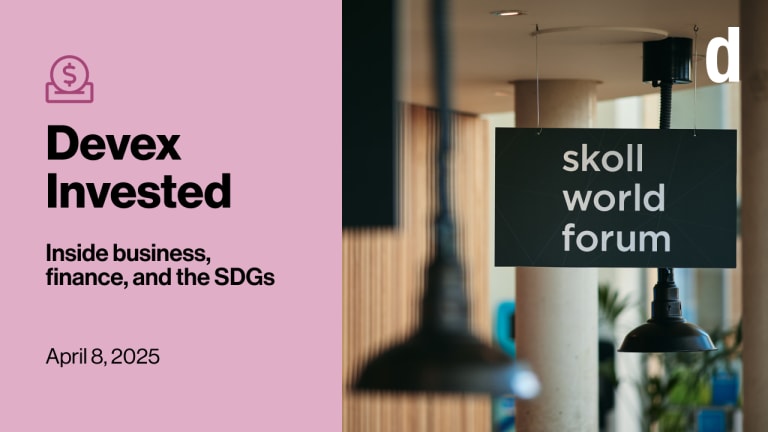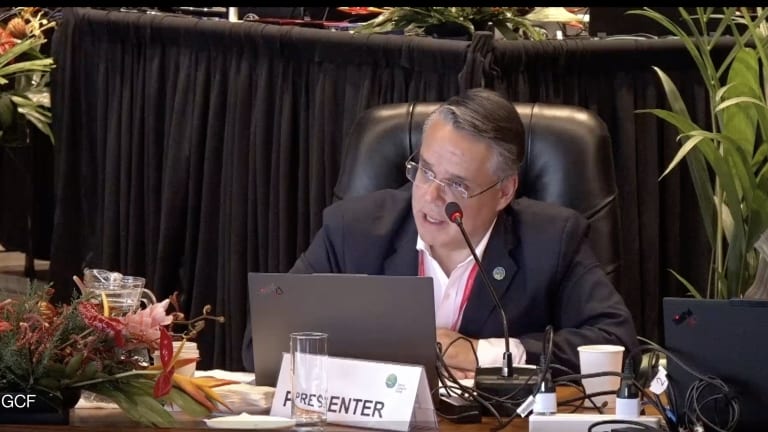Q&A: An Australian High Commission view on private partnerships
Before the third round of the Business Partnerships Platform is announced by DFAT, here is some important information for applicants of future funding rounds.
CANBERRA — The Department of Foreign Affairs and Trade recently announced the recipients of the latest round of the Business Partnerships Platform to support Australian aid objectives in India — a program managed by Palladium to promote private sector engagement in development. The projects are focused on women’s empowerment, improved health, and access to clean energy. “The BPP is not business as usual for DFAT, and the approach is quite different from a conventional government grant payment.” --— Timothy Kendall, economic counselor, Australian High Commission in New Delhi As we await the announcement from the third round of the partnerships, economic counselor Timothy Kendall from the Australian High Commission in New Delhi, India, discussed the importance of these partnerships for both DFAT and the recipients in a recent interview with Devex. Here is the interview, edited for length and clarity. What is the role of the High Commission in supporting BPP? The High Commission in New Delhi was heavily engaged in the selection of projects and will work closely with the BPP partners to maximize impact. We have selected projects that align with our broader bilateral objectives and the priorities of the India Economic Strategy. The High Commission strongly supports the BPP partnership model. The BPP is not business as usual for DFAT, and the approach is quite different from a conventional government grant payment. The Australian Government provides up to 500,000 Australian dollars [$355,072] in support for each partnership, which is at least matched by private sector and other partner funds, and all parties, including DFAT, work together to scale and achieve shared outcomes. How does the BPP India round support your objectives in India? The BPP is an example of a DFAT strategic investment that explores innovative ways to promote private sector growth and engages the private sector to achieve development outcomes. Through the BPP-India Window, we wanted to support projects that were scalable, fiscally sustainable, and had both social and commercial impact. We also wanted to support initiatives that aligned with the broader strategic objectives for the Australia-India bilateral relationship. Priority sectors for the BPP-India window were matched with those in the India Economic Strategy, in particular, agribusiness; resources and energy; and health. Gender equality and the empowerment of women and girls are integral to DFAT’s foreign policy, economic diplomacy, and development objectives, and projects were required to demonstrate a gender impact. “Partnerships are not, and should not be, an end in themselves. They provide a critical framework within which results can be delivered effectively for all parties.” --— Specifically, we were looking for projects that created employment opportunities for women, incorporated women into supply chains (as producers, suppliers, and distributors), or provided products or services that improved the lives of female consumers. What is the value that DFAT can give to these partnerships? Partners have access to our networks and knowledge of the business, political, and regulatory environments in India. We bring our development experience and knowledge, our convening power, and our networks to partners to a variety of stakeholders in government and business. We can also assist partners with program design. Through our managing contractor, Palladium, we support partners to improve their business plan design, build scale, and measure and create impact. For technical gender expertise, a gender adviser is available to support the design and delivery of gender approaches. Partnerships are not, and should not be, an end in themselves. They provide a critical framework within which results can be delivered effectively for all parties. Through this approach, DFAT anticipates stronger partnerships leading to better and more sustainable results. There are four initiatives you have supported as part of this rounds — how many applications were received and what was the range in quality? We received 49 applications and 15 applicants were shortlisted. Because of the quality of applications, shortlisting was extremely challenging. Nevertheless, we think we have identified the best partners and the projects that not only align with our strategic objectives but also provide a commercial benefit for the applicant. What feedback would you give future applicants? I would recommend being clear about what you bring to the partnership and why you wish to collaborate or partner with the Australian Government. [You should] consider the value that DFAT could bring and how working with DFAT allows you to reach scale or improve your commercial objectives and social impact, [and] demonstrate how the initiative can be sustained beyond the period of DFAT’s involvement. What are you most excited about for BPP moving forward? I am excited about the impact these partnerships will have and how they will deliver economic and social outcomes, particularly for women. From the High Commission’s point of view, we look for opportunities to extend our connections with business and community to help bring our countries closer together. The BPP has allowed us to develop new partners in states and in sectors where we may not have previously worked. This is very exciting as it allows us to have community level impact but also adds new dimensions to the Australia-India relationship. Above all, business has demonstrated the ability to bring fresh perspectives to seemingly intractable social and economic challenges. We are already seeing some partners looking to scale up their initiatives quite significantly and are pleased to be able to play a role in this.
CANBERRA — The Department of Foreign Affairs and Trade recently announced the recipients of the latest round of the Business Partnerships Platform to support Australian aid objectives in India — a program managed by Palladium to promote private sector engagement in development. The projects are focused on women’s empowerment, improved health, and access to clean energy.
As we await the announcement from the third round of the partnerships, economic counselor Timothy Kendall from the Australian High Commission in New Delhi, India, discussed the importance of these partnerships for both DFAT and the recipients in a recent interview with Devex.
Here is the interview, edited for length and clarity.
This story is forDevex Promembers
Unlock this story now with a 15-day free trial of Devex Pro.
With a Devex Pro subscription you'll get access to deeper analysis and exclusive insights from our reporters and analysts.
Start my free trialRequest a group subscription Printing articles to share with others is a breach of our terms and conditions and copyright policy. Please use the sharing options on the left side of the article. Devex Pro members may share up to 10 articles per month using the Pro share tool ( ).
Lisa Cornish is a former Devex Senior Reporter based in Canberra, where she focuses on the Australian aid community. Lisa has worked with News Corp Australia as a data journalist and has been published throughout Australia in the Daily Telegraph in Melbourne, Herald Sun in Melbourne, Courier-Mail in Brisbane, and online through news.com.au. Lisa additionally consults with Australian government providing data analytics, reporting and visualization services.




